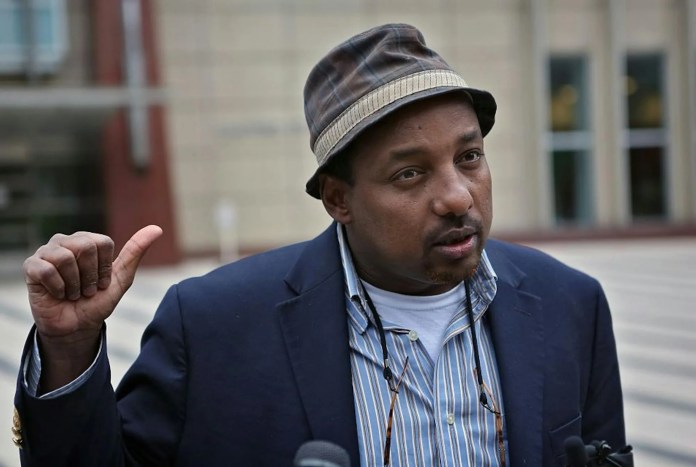MINNEAPOLIS, Minnesota – Omar Jamal, a prominent Somali-American community leader long seen as a bridge between Minnesota’s Somali diaspora and law enforcement, has been detained by U.S. Immigration and Customs Enforcement (ICE) agents in downtown Minneapolis.
Jamal, 52, was arrested on Friday, August 29, 2025, and is being held at Freeborn County Jail in Albert Lea, a facility used to house federal immigration detainees.
Jamal arrived in the United States more than two decades ago as a refugee fleeing civil war and famine in Somalia. In Minnesota, which is home to the largest Somali population in the United States, he became a highly visible advocate.
He served as executive director of the Somali Justice Advocacy Center, a nonprofit organization that aimed to assist immigrants in navigating the legal system. Over the years, he became a go-to source for journalists on topics ranging from police shootings to terrorism investigations involving Somali-Americans.
“Omar has been a respected Somali-American civic leader who spent years advocating for public safety, interfaith cooperation, and stronger ties between law enforcement and immigrant communities,” his attorney, Abdiqani Jabane, said in a statement.
In 2020, Jamal was hired by the Ramsey County Sheriff’s Office as a civilian community service officer. His role, according to county officials, was to improve communication between law enforcement and immigrant residents.
“He’s done a great job in that role,” said Steve Linders, a spokesman for the Sheriff’s Office. “He has played an integral role in helping us liaise with the Somali community in Minnesota.”
Why he was arrested
Jamal’s legal troubles date back to 2005, when he was convicted of immigration fraud in Tennessee and sentenced to one year of probation. His conviction triggered a referral to federal immigration authorities. Though his appeal was denied, he remained in the country.
In 2011, Jamal was issued a final order of removal but was not deported. That order remains active, according to the Department of Homeland Security (DHS).
On Friday, ICE agents acted on the order, detaining Jamal in Minneapolis. DHS officials confirmed the arrest, citing his criminal record.
“Under the Trump administration, America is no longer a safe haven for the world’s criminals,” a DHS spokesperson said in a statement to local media. “Mr. Jamal’s history includes assault, a restraining order issued by a court, three counts of fraud, and two counts of making a fraudulent statement. He was ordered removed in 2011.”
Jamal’s attorney, Jabane, strongly disputed the portrayal, stressing his client’s decades of community service.
“Mr. Jamal has devoted decades to serving Minnesota’s Somali-American community and strengthening trust with law enforcement,” Jabane said. “We are engaged with ICE and will pursue all lawful remedies to protect his rights and secure his release.”
He added that Jamal’s detention came as a shock to many community members, who have seen him work directly with police and government officials on public safety initiatives.
A divisive figure
While Jamal has often been praised by law enforcement and civic leaders, his prominence has not been without controversy. Some Somali-Americans have questioned whether he truly represented their views, while others accused him of being too close to government agencies during periods of heightened scrutiny on immigrant communities.
Still, his defenders say he has been a consistent voice for dialogue during tense times, including after high-profile police shootings and during federal counterterrorism investigations involving Somali youth.
“He was always the one who stood up to explain things to the media and to the government,” said a Somali-American elder in Minneapolis who asked not to be named. “Even if people disagreed with him, he was there when the community needed someone to speak.”
Minnesota is home to the largest Somali population outside Africa, with estimates ranging from 70,000 to 100,000 people, concentrated in the Twin Cities. Many arrived as refugees during and after Somalia’s civil war in the 1990s and early 2000s.
Community leaders like Jamal have played a crucial role in helping new arrivals navigate housing, education, immigration paperwork, and relations with law enforcement.
His detention has therefore raised concerns about what message it may send. “When someone who has worked so hard to build bridges is suddenly arrested, it shakes people’s trust,” said the same community elder.
As of Friday evening, ICE had not explained why it acted now on Jamal’s 2011 deportation order. He remains in federal custody at Freeborn County Jail while his attorney prepares to challenge the detention.
The case highlights the tension between old deportation orders and years of community service. For many Somali-Americans in Minnesota, Jamal’s detention underscores the precarious position of immigrants who, despite building long lives in the United States, remain vulnerable due to past legal issues.
“His record is clear, but so is his service,” Jabane said. “We will continue to fight for him.”


